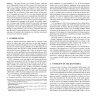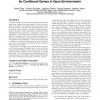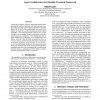18 search results - page 3 / 4 » Agent Capabilities: Extending BDI Theory |
EPIA
2005
Springer
15 years 5 months ago
2005
Springer
In this paper, we investigate the link between logics of games and “mentalistic” logics of rational agency, in which agents are characterized in terms of attitudes such as beli...
ECAI
2004
Springer
15 years 5 months ago
2004
Springer
This paper presents a new model of agency, called the KGP (Knowledge, Goals and Plan) model. This draws from the classic BDI model and proposes a hierarchical agent architecture wi...
118
click to vote
ATAL
2008
Springer
15 years 1 months ago
2008
Springer
Multiagent environments are often highly dynamic and only partially observable which makes deliberative action planning computationally hard. In many such environments, however, a...
ATAL
2008
Springer
15 years 1 months ago
2008
Springer
Coalition formation is an important capability for automated negotiation among self-interested agents. In order for coalitions to be stable, a key question that must be answered i...
107
Voted
AAAI
1997
15 years 1 months ago
1997
Teamwork in complex, dynamic, multi-agent domains mandates highly flexible coordination and communication. Simply fitting individual agents with precomputed coordination plans w...



